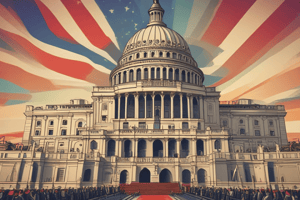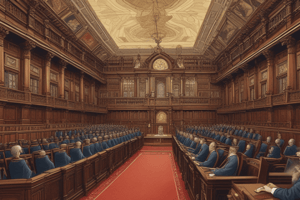Podcast
Questions and Answers
How do constitutions reflect the political power dynamics at the time of their writing?
How do constitutions reflect the political power dynamics at the time of their writing?
Constitutions capture the relative influence of various political groups involved in drafting, showcasing their hopes, values, and power relations.
What challenges do judges face when interpreting constitutions with open-ended language?
What challenges do judges face when interpreting constitutions with open-ended language?
Judges must navigate subjective interpretations influenced by societal contexts, personal beliefs, and evolving political landscapes.
In what ways might judges incorporate extra-legal values into their interpretations of a constitution?
In what ways might judges incorporate extra-legal values into their interpretations of a constitution?
Judges may reference historical context, societal values, and political circumstances to justify their decisions in constitutional interpretation.
What is the significance of the S v Zuma case in understanding constitutional interpretation in South Africa?
What is the significance of the S v Zuma case in understanding constitutional interpretation in South Africa?
How can shifts in societal conditions influence judicial interpretation of fundamental rights?
How can shifts in societal conditions influence judicial interpretation of fundamental rights?
What role does the concept of separation of powers play in the interpretation of constitutional texts?
What role does the concept of separation of powers play in the interpretation of constitutional texts?
Why is it important for judges to be aware of their own preconceptions when interpreting constitutional language?
Why is it important for judges to be aware of their own preconceptions when interpreting constitutional language?
How does the living document theory relate to federalism in constitutional interpretation?
How does the living document theory relate to federalism in constitutional interpretation?
What was the primary reason the Separate Representation of Voters Act was deemed of no force by the Appellate Division?
What was the primary reason the Separate Representation of Voters Act was deemed of no force by the Appellate Division?
What was the effect of the South Africa Amendment Act of 1958 on judicial review in the country?
What was the effect of the South Africa Amendment Act of 1958 on judicial review in the country?
How did the changes to the size of the Appellate Division influence the outcome of Collins v Minister of the Interior?
How did the changes to the size of the Appellate Division influence the outcome of Collins v Minister of the Interior?
What does Section 59 of the 1961 Constitution indicate about the power of the Parliament in South Africa?
What does Section 59 of the 1961 Constitution indicate about the power of the Parliament in South Africa?
In what way did the extreme form of parliamentary supremacy impact human rights in South Africa prior to 1994?
In what way did the extreme form of parliamentary supremacy impact human rights in South Africa prior to 1994?
What two themes combined to give the South African state its particularly brutal character before 1994?
What two themes combined to give the South African state its particularly brutal character before 1994?
What was the significance of the ruling in Sachs v Minister of Justice concerning the power of the judiciary?
What was the significance of the ruling in Sachs v Minister of Justice concerning the power of the judiciary?
How did the amendments to the Union Constitution impact voting rights for black South Africans?
How did the amendments to the Union Constitution impact voting rights for black South Africans?
What role do banning orders play in the context of parliamentary sovereignty as discussed by Stratford ACJ?
What role do banning orders play in the context of parliamentary sovereignty as discussed by Stratford ACJ?
How does the rejection of challenges to banning orders illustrate the principle of judicial review?
How does the rejection of challenges to banning orders illustrate the principle of judicial review?
In what way does the discussion on banning orders reflect principles of federalism?
In what way does the discussion on banning orders reflect principles of federalism?
What does Stratford ACJ's statement reveal about the separation of powers in South Africa?
What does Stratford ACJ's statement reveal about the separation of powers in South Africa?
Why is the honest exercise of discretion significant in the context of banning orders?
Why is the honest exercise of discretion significant in the context of banning orders?
How might the existence of banning orders challenge fundamental rights?
How might the existence of banning orders challenge fundamental rights?
Explain how the ability of Parliament to make encroachments on individual rights is perceived in the context of South African governance.
Explain how the ability of Parliament to make encroachments on individual rights is perceived in the context of South African governance.
What implications does the court's stance on discretion have for future legal challenges in South Africa?
What implications does the court's stance on discretion have for future legal challenges in South Africa?
Flashcards are hidden until you start studying
Study Notes
Parliamentary Sovereignty in South Africa
-
The South African government used banning orders to restrict political activities of those opposed to government policies. These orders prohibited individuals from being present in certain areas if deemed to be promoting hostility between European inhabitants and other groups.
-
The court upheld the validity of banning orders, stating Parliament has the right to make laws that encroach upon the rights of individuals, and it is the court's duty to enforce those laws.
-
This view represents an extreme interpretation of parliamentary sovereignty, where Parliament's power is seen as absolute and unfettered.
Constitutional Interpretation and its Dynamic Nature
-
Constitutions are considered "living documents" subject to interpretation by judges in a constantly evolving environment.
-
The language within constitutional texts, often open-ended and general, requires judges to interpret and apply the meaning in a dynamic way.
-
These judicial interpretations are influenced by social, economic, and political realities, acknowledging the subjective nature of interpretation and the ongoing evolution of societal values.
The South African Constitutional Court & its Role
-
The South African Constitutional Court has acknowledged the inherent subjectivity and open-ended nature of constitutional language.
-
The court's decisions may draw upon extra-legal values and contextual factors, including South African political history, to justify their decisions.
Studying That Suits You
Use AI to generate personalized quizzes and flashcards to suit your learning preferences.




